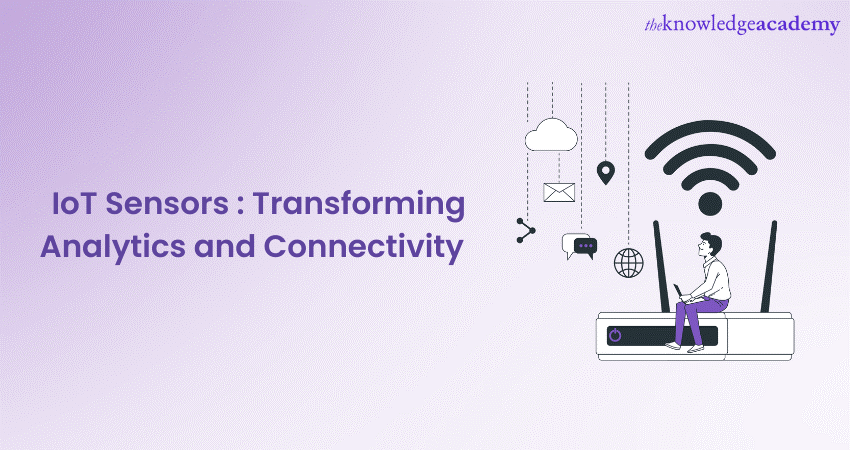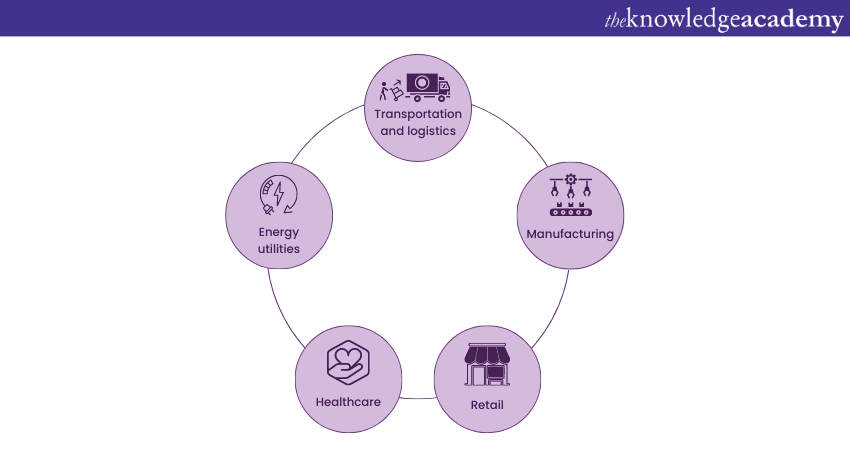We may not have the course you’re looking for. If you enquire or give us a call on +1 7204454674 and speak to our training experts, we may still be able to help with your training requirements.
Training Outcomes Within Your Budget!
We ensure quality, budget-alignment, and timely delivery by our expert instructors.

The Internet of Things (IoT) has emerged as a revolutionary force, connecting devices and enabling seamless communication. At the heart of this transformation lie IoT Sensors, which gather real-time data and drive insights for enhanced analytics and connectivity. These sensors detect and measure physical or environmental conditions, converting them into digital information. These have become a tool for companies to collect and analyse data and develop better business strategies to cater to the target customers effectively.
According to Statista, the revenue from these sensors is expected to amount to £33.7 billion by 2025. Read this blog to learn more about IoT Sensors and how they are used to enhance analytics and identify the industries that have been transformed as a result of them.
Table of Contents
1) What are IoT Sensors?
2) IoT Sensors: A tool for enhancing analytics
3) Industries transformed by IoT Sensors
a) Transportation and logistics
b) Manufacturing
c) Retail
d) Healthcare
e) Energy and utilities
4) Conclusion
What are IoT Sensors?
IoT Sensors, or Internet of Things sensors, are devices designed to detect and measure physical or environmental conditions and convert them into digital data. These sensors are a fundamental component of the IoT ecosystem, enabling real-time data collection from the physical world and facilitating communication between devices and systems.
IoT Sensors come in various forms and functionalities, depending on the specific parameters they monitor. They can measure temperature, humidity, pressure, motion, light intensity, sound, air quality, etc. Equipped with wireless communication capabilities such as Wi-Fi, Bluetooth, or cellular connectivity, these sensors transmit the collected data to centralised systems or the cloud for further analysis and utilisation.

IoT Sensors: A tool for enhancing analytics
IoT Sensors have revolutionised analytics by providing a wealth of real-time data, empowering businesses to gain valuable insights into various processes. These sensors can monitor and measure diverse parameters such as temperature, motion, humidity, light intensity, etc. By collecting and transmitting this data, IoT Sensors enable businesses to optimise their operations and make data-driven decisions.
IoT Sensors embedded in machinery in manufacturing industries can monitor equipment performance and detect anomalies in real time. This data helps predict maintenance requirements, prevent unexpected breakdowns, and optimise production efficiency. Manufacturers can identify patterns and trends by analysing sensor data, enabling them to streamline processes, reduce costs, and improve overall productivity.
In agriculture, IoT Sensors such as soil moisture sensors provide crucial data for optimising irrigation and fertilisation practices. Farmers can monitor soil moisture levels in real-time, ensuring crops receive the right amount of water and nutrients. This data-driven approach improves crop yields, reduces water waste, and enhances sustainability.
Integrating IoT sensor data with advanced analytics tools such as Machine Learning (ML) and Artificial Intelligence (AI) unlocks further possibilities. These technologies can process and analyse vast amounts of sensor data, identify correlations, predict outcomes, and automate decision-making processes. Predictive maintenance is a prime example, where IoT Sensors combined with analytics algorithms can anticipate equipment failures and schedule maintenance proactively, minimising downtime and optimising maintenance costs.
Furthermore, IoT Sensors enable personalised customer experiences by collecting data on consumer preferences and behaviours. By analysing this data, businesses can tailor their marketing strategies, recommend personalised products or services, and enhance customer satisfaction.
Join our Internet of Things (IoT) Training course to learn what is IoT, its key features, and architecture.
Industries transformed by IoT Sensors

Implementing IoT Sensors has brought about transformative changes across various industries, revolutionising traditional processes and enabling new possibilities. Let's explore some of the industries that have experienced significant transformations through their integration.
Transportation and logistics
In the transportation and logistics industry, IoT Sensors have revolutionised operations by providing real-time tracking and monitoring capabilities. Sensors embedded in vehicles, shipment containers, and logistics infrastructure enable precise location tracking, temperature monitoring, and security measures. This allows for efficient supply chain management, optimised route planning, and improved delivery times. With their help, logistics companies can enhance transparency, reduce costs, mitigate risks, and provide better customer service.
Manufacturing
IoT Sensors have profoundly impacted the manufacturing sector by enabling the concept of Industry 4.0. With sensors embedded in machinery and production lines, manufacturers can collect real-time data on equipment performance, energy consumption, and product quality. This data allows for predictive maintenance, optimised resource allocation, and enhanced productivity. They also facilitate seamless communication and collaboration between different stages of the manufacturing process, leading to increased efficiency, reduced downtime, and improved overall operations.
Learn the architecture and design approaches of IoT systems with our Internet Of Things IoT Systems And Applications Training course.
Retail
The retail industry has witnessed a significant transformation by integrating such sensors. Sensors embedded in shelves, products, and shopping carts provide valuable data on inventory levels, customer preferences, and shopping patterns. This data enables retailers to optimise stock management, streamline supply chains, and personalise marketing campaigns. With IoT Sensors, retailers can enhance the customer experience by offering personalised recommendations, targeted promotions, and smoother checkout processes, ultimately increasing customer satisfaction and loyalty.
Healthcare
IoT Sensors have revolutionised the healthcare industry, particularly in remote patient monitoring and telehealth. Wearable sensors can continuously monitor vital signs, such as heart rate and blood pressure, transmitting the data to healthcare professionals in real time. This allows for early detection of health issues, remote patient monitoring, and timely interventions. IoT Sensors also enable healthcare providers to track medication adherence, optimise resource allocation, and improve patient outcomes. Integrating these sensors in healthcare systems leads to more efficient healthcare delivery, reduced hospital readmissions, and improved patient satisfaction.
Energy and utilities
The energy and utilities sector has been transformed by IoT Sensors, enabling smart grid systems and efficient energy management. These sensors help monitor energy consumption, detect power outages, and optimise resource allocation. By collecting real-time data on energy usage, utilities can identify areas for conservation, predict demand patterns, and optimise energy distribution. Smart meters and sensors also enable consumers to monitor their energy usage, facilitating energy conservation and cost savings.
Understand detection and mitigation of ransomware attacks by joining our Security And Privacy In Internet Of Things (IoT) Training course.
Conclusion
We hope you enjoyed reading this blog on IoT Sensors and how they help in enhancing analytics and connectivity. Today, IoT has emerged as a tool that enables companies to track the sale of their products and other such activities in real-time. These sensors help organisations create accurate reports by accessing such data and making better business decisions.
Learn latest technologies such as 5G, IoT, Chatbots, Quantum Computing, AR and VR with our Advanced Technologies Courses.
Frequently Asked Questions
Upcoming Advanced Technology Resources Batches & Dates
Date
 Internet of Things IoT Systems and Applications Training
Internet of Things IoT Systems and Applications Training
Thu 30th Jan 2025
Thu 3rd Apr 2025
Thu 8th May 2025
Thu 10th Jul 2025
Thu 11th Sep 2025
Thu 6th Nov 2025







 Top Rated Course
Top Rated Course


 If you wish to make any changes to your course, please
If you wish to make any changes to your course, please


